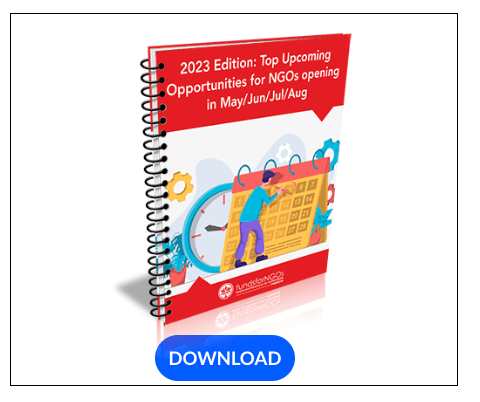
Deadline: 23-Jun-23
The 2023 Horizon Prize, powered by MIT Solve, seeks technology-based solutions that decrease carbon footprints in the rare disease healthcare space, while centering patient priorities.
To that end, the Prize seeks a wide variety of solutions that:
- Improve the rare disease patient diagnostic journey – reducing the time, cost, resources, and duplicative travel and testing for patients and caregivers
- Enhance efficiencies in clinical trials and research, including data collection and sharing
- Reduce single-use products, unnecessary plastics, and medical/hazardous waste throughout research and manufacturing
- Create and promote alternative packaging that may be reusable, recyclable, or biodegradable without compromising sterility or safety
- Optimize transportation of supplies and treatments by addressing shipping inefficiencies, cold storage, and last-mile delivery
Benefits
- Finalists will have two opportunities to present their solutions in front of distinguished judges during the selection process. The first pitch event will be a virtual, closed-door session with judges and Horizon and MIT Solve staff.
- The final pitch event will take place at the 2023 Concordia Annual Summit on September 18-20 in New York City. Here, finalists will have the chance to showcase their solutions publicly, attend a dinner with judges hosted by Horizon, and attend the live winner announcement on the Concordia Annual Summit main stage.
- $150,000 in prize funding is available for one winning solution team for the 2023 Horizon Prize.
What type of solutions are eligible?
- Solution applications must be written in English. They welcome both early-stage and growth-stage solutions to submit their applications.
- Early-stage solutions include:
- Prototype: A solution or organization that is building and testing its product, service, or business model. If for-profit, a new company getting off the ground that has raised little or no institutional capital (less than $500,000) in pre-seed fundraising.
- Pilot: A solution or organization that is deploying a tested product, service, or business model in at least one community. If for-profit, a young company that is working to gain traction and that has raised less than $2 million in institutional capital in seed funding.
- Growth-stage solutions include:
- Growth: A solution or organization with an established product, service, or business model rolled out in one or, ideally, several communities, which is poised for further growth in multiple communities or countries. If for-profit, an early-stage company that has established a track record and is seeking to raise a round of roughly $2 million to $15 million in institutional capital in a Series A or potentially B round.
- Scale: A solution or organization that is working in several communities or countries. It is looking to scale significantly, focusing on increased efficiency. If for-profit, a successful company that is scaling its operations and seeks to raise a round of more than $15 million in institutional capital.
- Please note that they will not review or select Concept-stage solutions. If you have a Concept-stage solution, they hope that you will consider applying in the future when your solution is further developed.
- Concept: An idea being explored for its feasibility to build a product, service, or business model based on that idea.
- The most important thing is that your solution addresses the focus of the Horizon Prize 2023. Solutions may be narrowly focused on a product innovation or broadly focused on a tech platform that focuses on a systems based solution. They encourage people of all backgrounds to submit their applications.
Eligibility Criteria
- Applicants can be an individual, a team, or an organization. Solutions can be any type of organization, including but not limited to nonprofit, for-profit, or hybrid organizations. However, US law prevents MIT Solve from awarding funds to persons ordinarily resident in Iran, Cuba, Syria, North Korea, Crimea, Russia, and Belarus, or from parties blocked by the US Treasury Department.
- The Horizon Prize encourages and actively seeks solutions led by people with rare diseases and underrepresented groups and identities.
- Applicants to previous Solve Challenges, including the 2021 and 2022 Horizon Prize, are invited to apply for the 2023 Horizon Prize.
- Winning solutions for the 2021 and 2022 Horizon Prize are not eligible to participate in the 2023 Horizon Prize.
Judging Criteria
- Alignment: The solution addresses the key dimensions of Horizon Prize 2023.
- Potential for Impact: The planned solution implementation has the potential to decrease the environmental impact of the rare disease health care space.
- Feasibility: The team has a realistic, practical plan for implementing the solution, and it is feasible in the given context.
- Innovative Approach: The solution includes a new technology, a new application of technology, a new business model, or a new process for solving the Prize.
- Human-Centered Design and Inclusion: The solution is designed with and for underserved communities, and the solution team demonstrates proximity to the community and embodies and addresses diversity, equity, and inclusion through their solution.
- Scalability: The solution has a plan for financial viability and the potential to be scaled to affect the lives of more people.
- Partnership Potential: The applicant clearly explains how the solution would benefit from the resources that the Horizon Prize community is positioned to provide.
Details
- July 28, 2023: Finalists announced
- August 30, 2023: Virtual pitch event for finalists
- September 19-20, 2023: Live pitch event and winner announcement at Concordia Annual Summit in New York.
For more information, visit Solve MIT.
